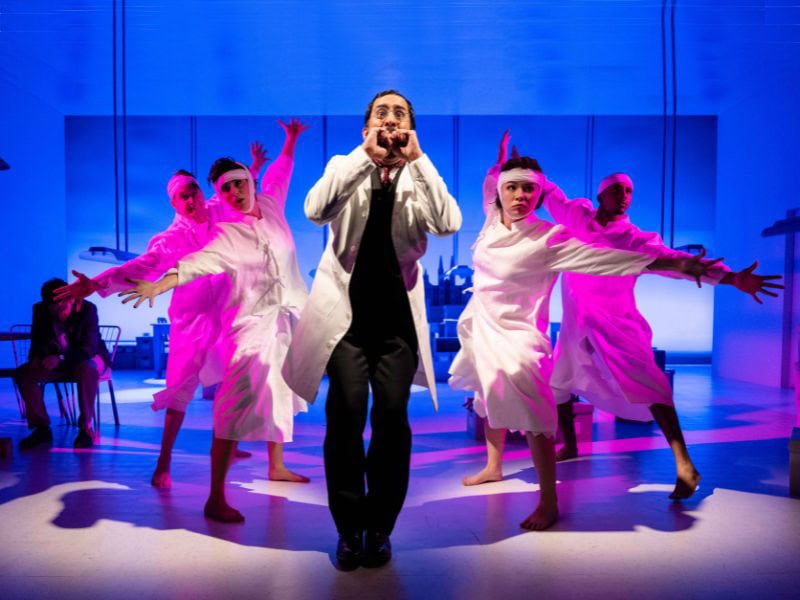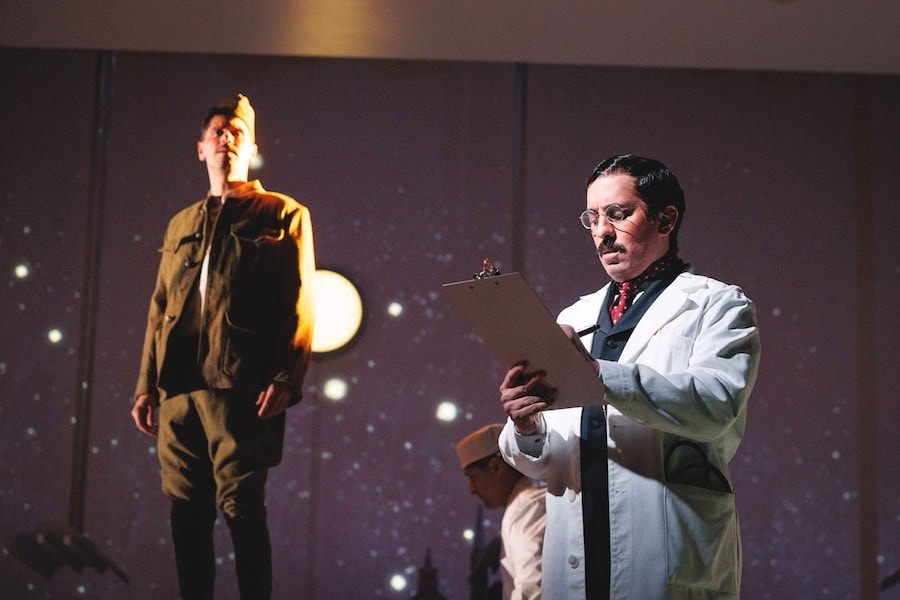By Ian Kirkland
Unknown Soldier’s study of the past begins in a sea of greige. Gray cartons tower high on gray tables. Gray pens click mutely onto gray desks. Clerks file papers into folders into binders into boxes into obsolescence. Of these thousands of entries, a small hope escapes: a newspaper clipping of a couple having a picnic with the lede “Has Unknown Soldier Found True Love?”
This question, or rather the uncertainty it suggests, haunts Arena Stage’s production of Unknown Soldier. Originally developed in association with the Playwrights Horizons writers program, Unknown Soldier sees obstetrician Ellen Rabinowitz delve deep into her family’s past after rediscovering a photograph of her grandmother and an unfamiliar man in uniform. She recruits the help of librarian Andrew in her search and increasingly plumbs the depths of the unknown, the concealed, and the power that both have held over her family for generations. As Ellen’s search broadens, it implicates the past not only in the present but in the future as well. What she must navigate to make sense of it all is not only a sea of gray boxes and a barrage of dead ends but a dreamscape suspended between temporalities.

To shed further light on Unknown Soldier’s playful approach to such grand and urgent inquiries, I chatted with Arena veteran Nehal Joshi on a Zoom call (edited for length and clarity) that only a person of Nehal’s charm and wit could make so amusing.
Nehal plays Dr. Joel Levinson, a doctor at a New York mental institution whose mission is to rehabilitate a shell-shocked, amnesiac soldier placed in his care. Dr. Levinson is a unique role, at times somber and stoic, yet also the force behind Unknown Soldier’s most classically “Broadway” number, “The Memory Song.” A jazzy song-and-dance routine briefing the audience on the types of amnesia most commonly experienced, “The Memory Song” is a hilarious and vaudevillian romp. It is also a stylistic departure from the rest of the show, which, while retaining a thread of comedy throughout, deals with very cerebral subjects in quite a naturalistic way.
Ian: What do you think such a jazzy performance number adds to the show — other than a good time?
Nehal: I’m probably one of the first actors who was like, Do we really need this number in the show? Have you ever thought about cutting it? It just seemed weird and out of left field. Then I started watching runs and I was like, Oh, now I understand dramaturgically why this song is here. You have “Andrew’s Story,” which is a song that Adam [Chanler-Berat] sings. And then you have “I Give Away Children,” a song that is gut-wrenching in the same way “Andrew’s Story” is and very personal and vulnerable. If there was nothing in between these songs, it would take away from “I Give Away Children” — Lora Lee [Gayer]’s song. So I started to realize that “The Memory Song” is kind of an amuse-bouche, a palette cleanser that is so jarring and so weird it knocks the audience out of the moment of “Andrew’s Story.”
I recognized a kind of humor in Dr. Levinson that is facetious and dark in the way he approaches these disorders and handles the unknown soldier’s story. It reminded me of Chicago’s Billy Flynn and the Emcee in Cabaret. What inspiration did you pull from in your interpretation of the Doctor?

I love that you said the Emcee in Cabaret. Alan Cumming as the Emcee was a lot of inspiration for me. I’ve been lucky enough to have worked with Alan in The Threepenny Opera. I liked his puckishness, his impishness, and the way he lures an audience in with subtlety. I also watched a lot of Groucho Marx because with the glasses on and the mustache, I look like Groucho Marx. So I was trying to figure out ways to mine that.
And then in my mind, I put a line between the character who does the song and Dr. Joel Levinson who does the hospital scenes. I was pre-med for a while in college, so I drew on my experience around doctors and this drive to help people. That was an inspiration to me. Also, the Doctor has a lot of secrets like the Emcee does — only in our play I don’t tell my secrets.

Just like Ellen and Andrew in the present, the Doctor makes it his mission to uncover the unknown soldier’s lost memories. What do you think the play makes of these parallel searches for meaning?
I think it says something like “Trying to put together a puzzle without all the pieces is a very Sisyphean task that is probably going to fill you with lots of rage and frustration.” It’s hard to put together puzzles when you don’t have all the pieces. And the interesting question in the end is, Why do we do these things? Why do we have this inherent need to feel like we need to figure out what the past is? Why is that so important? We live in a world with 23andMe now, all the genealogy stuff, Ancestry.com. People have really gone into trying to figure out what their family lineage is.
Yeah, that need to know everything is quite pervasive, and Unknown Soldier makes use of the unknown in clever ways. What do you think Unknown Soldier can tell us about coming to terms with our history — especially when we can’t truly “know what happened” in it?
That’s a hard question. It’s so personal. When we’re trying to come to terms with who we are or where we’ve come, from the salient question often is “What is the thing that we are trying to fill with that information?” That’s the hardest thing. We all become obsessed with so many things. I am obsessed. I have my obsessions. We all do, whether it’s Beyoncé or Mahjong or whatever it is. The question in the end is, Why are you obsessed with those things? What is it about the thing that you’re obsessed with?
Jumping off of that, we often speak about the present in a way that tethers it to the past or the future. In our particular moment of global upheaval and anxiety, why do you think Unknown Soldier is particularly resonant?
The past is always prologue, right? That’s what they say. Currently, we’re dealing with ancient strifes. Strifes that go back, on some levels, to the beginning of civilization; strifes that have been there for a long time. Especially with what’s happening in Israel and the Middle East. And these are things that haven’t been dealt with or haven’t been dealt with in a satisfactory way. There is an old Buddhist quote: “Whatever you resist, persists.” And if you have something about your past or something about yourself that is nagging you, if you don’t deal with it, it’s going to cause ripples and waves in your life. I think that’s what’s happening in the play and what’s happening globally in a huge way.
Arena’s dramaturg Otis Ramsey-Zoë writes that Unknown Soldier is a play “concerned with returns,” of truth, of doubt, of secrets long-buried. You yourself have returned to Arena Stage for seven mainstage productions. If you could return to and revive a previous Arena show for a 2024 audience, what would it be and why?
Oh my God, seven times. That’s crazy. Every time I hear that number, I think: I was a kid who came to the student matinees at Arena. I want to say Mother Courage [and Her Children by Bertolt Brecht] would be great because it’s all about war and the coming of war, then the horrors of war and the banality of war. But it’s probably Disgraced [by Ayad Akhtar], which is a play that won the Pulitzer. It was really prescient. It was way before its time. It was written maybe 15 years ago, and it’s about the trappings and dangers of partisanship, what team you’re a part of, whether that’s the team of your race, the team of your religion, the team of your political parties. It talked about the dangers of that mentality way before it became part of the national dialectic.
I was really proud of that performance. It was a 90-minute mental breakdown and it was really hard to do, but at the end of it, I felt amazing, even though everybody was like “How do you do that every night?” because I would just be a complete bawling mess by the end of the show, like a shell-shattered man. The great thing was I got to give away everything I had inside me every night and leave it out there and go away free and empty by the end of every performance.
Speaking of giving a production your all and feeling freed after, I feel like the opposite can often be said of the viewer, that they come away with more questions than answers when the curtain drops. What do you hope people take away from Unknown Soldier?
It’s really personal, but I would say, touching on something I said earlier: we’re all obsessed. We all have our obsessions about things. The real question is: Why are we obsessed with the things we’re obsessed with? And what does that say about who we are as a person and how we interact with the world?
Unknown Soldier plays through May 5, 2024, in the Kreeger Theater at Arena Stage, 1101 6th St SW, Washington, DC. Tickets ($41–$95) may be obtained online, by phone at 202-488-3300, or in person at the Sales Office (Tuesday-Sunday, 12-8 p.m.). Arena Stage offers savings programs including “pay your age” tickets for those aged 30 and under, student discounts, and “Southwest Nights” for those living and working in the District’s Southwest neighborhood. To learn more, visit arenastage.org/savings-programs.
Running Time: One hour and 45 minutes, without an intermission
The program for Unknown Soldier is online here.
Closed captions are available via the GalaPro app.
COVID Safety: Arena Stage recommends but does not require that patrons wear facial masks in theaters except in designated mask-required performances (Sunday, April 21, at 2 p.m.; Tuesday, April 23, at 7:30 p.m.; Wednesday, May 1, at 12 p.m.; Saturday, May 4, at 8 p.m.). For up-to-date information, visit arenastage.org/safety.
 Ian Kirkland is a journalist, editor, and storyteller with a keen and discerning eye for performance without bounds. He began writing about the performing arts from the auditoriums of high schools across the Beltway area and has taken his love of theater and the spoken word to the Edinburgh Fringe, London’s VAULT festival, the West End, and, most recently, back home to the DMV.
Ian Kirkland is a journalist, editor, and storyteller with a keen and discerning eye for performance without bounds. He began writing about the performing arts from the auditoriums of high schools across the Beltway area and has taken his love of theater and the spoken word to the Edinburgh Fringe, London’s VAULT festival, the West End, and, most recently, back home to the DMV.
SEE ALSO:
A moving and thought-provoking ‘Unknown Soldier’ is recalled at Arena (review by D.R. Lewis, April 13, 2024)




